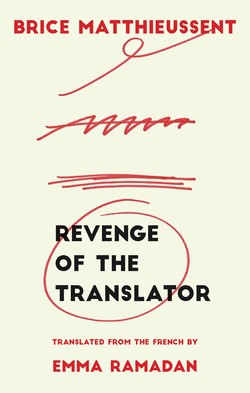Читать книгу Revenge of the Translator - Brice Matthieussent - Страница 33
На сайте Литреса книга снята с продажи.
Оглавление*
*All of the following passage:
My father was a long-distance captain, petroleum engineer, geologist, film actor, lover of French poetry and literature, test driver and sewage worker, dowser, mason, upholsterer, surveyor, gigolo in his spare time, pen pusher and amateur painter, sculptor and rod-fisherman, champion swimmer (it was at the public pool that he seduced the water nymph who would become my mother), air traffic controller, distinguished skier and seasoned mountaineer (it was to the immaculate and then-deserted slopes that he would soon bring her on vacation), lead trawler, collector of postage stamps and smoker of cigars (it’s presumably because of these pastimes that over the years he later tolerated the drudge of married life).
As they say in the notes at the bottom of administrative forms, “Cross out where not applicable” or “Check the appropriate box.” But when it comes to a father, does there exist such a thing as nonapplicable or an appropriate box? So I leave as is this improbable enumeration and supply neither birth date nor social security number. Nevertheless, here are a few specifications that will never appear on any administrative form:
Comfortably settled in front of the black-and-white television screen, a glass of cognac close at hand, a pungent Cuban in the other, my father never missed a rugby match or a night of wrestling (I would watch TV with him sometimes, after my mother went upstairs to go to bed, and I still remember the match between the White Angel and the infamous Béthune Executioner, in a balaclava and wearing all black: athletes dressed for the small screen even then). His usual disappointments because of the ORTF didn’t stop him from looking forward to the next sports broadcast. Often away for work, he would travel to India, Brazil, the United States, or, more modestly, to Marseille, for stretches varying from a few weeks to several months. He spoke English fluently and, in the 50s, was a fervent defender of all that came from America: checkered shirts with a button-up collar, Johnnie Walker “Red Label” whiskey with the swashbuckler in a redingote and shiny top hat on the label, LPs of jazz and that famous burgeoning music, rock ‘n’ roll, Reader’s Digest, plastic models of the B-25 bomber, of battleships and aircraft carriers, of dinosaurs and pterodactyls, cars with streamlined wing tips in shiny chromes (he owned a Versailles, then an Ariane, before buying an Ovni: the nauseating DS), he defended the dollar and progress, morality, technique, and work, but most importantly he displayed from morning to night an unwavering optimism. He flew in the Super Constellation and had a fondness for the multilingual flight attendants. Curiously, he did not like the cinema.
My mother, an Anglophile, made me read from a young age Somerset Maugham (I found it strange that she pronounced his name “Môme”) and Washington Irving, Charles Dickens, and Graham Greene. Sometimes on summer afternoons, lying side by side in the sun on two chaises longues (we called them “transats”), in the vast garden of the house we rented for vacation, she and I would read the pages of those novels in turn and out loud. Face protected by a large straw hat, dressed in a loose violet dress with a multicolored pattern or in a silk sari brought back from India, she would listen, a kind smile on her lips, to my hesitant and diligent voice. Then she would take over and each time I would admire her melodious accent, which enchanted me all the more because I had no other to compare it to: we rarely went to the movies and the babbling television was exclusively in French. Reading was how I learned English.
all of this passage is my own.
Scanning the horizon, I can already make out the dusty cloud of Freudians rushing over at a gallop.
Nevertheless I add with no remorse these personal confidences that evoke, through Abel Prote, his childhood and his precocious bilingualism. (Transatlantic Nubility)
